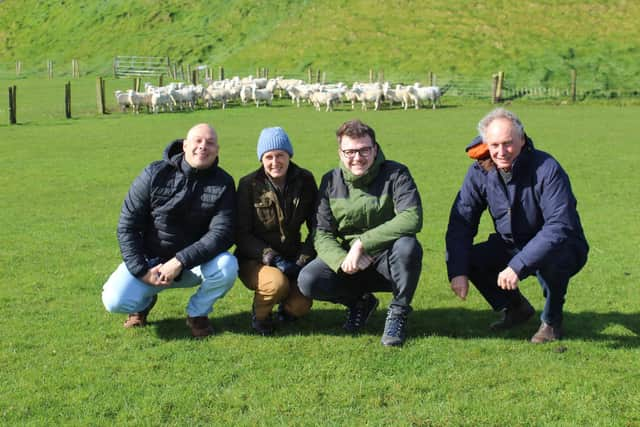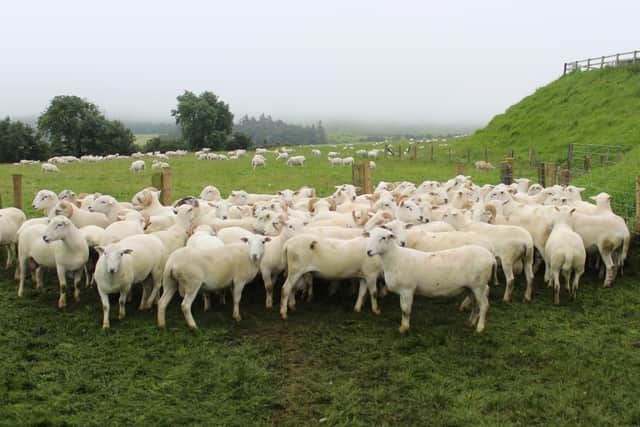Nuffield Scholars visit the EasyCare sheep flock of Campbell Tweed
and live on Freeview channel 276
A total of seven different countries were represented within the visiting group.
The Tweeds’ Ballycoose farm is located close to the village of Cairncastle, overlooking the Irish Sea in East Co Antrim.
Advertisement
Advertisement
The Nuffield group was visiting the island of Ireland to get a sense of how farming plays a role at the heart of the Irish economy.


The EasyCare is a composite breed of sheep comprising mostly Welsh Mountain and Wiltshire Horn bloodlines. It was developed almost 60 years ago with breed members specifically selected for their wool shedding and polled traits.
Monitoring animal performance within his sheep flocks had always been a priority for Campbell.
Ten years prior before switch to self shedding sheep, he had to committed to complete animal recording within the flock of pedigree Blackface ewes that had previously been on the farm.
And this practice has been added to over the years.


Advertisement
Advertisement
“Each lamb is tagged at birth and, thereafter, electronically recorded on a regular basis throughout the period of its stay on the farm,” he explained.
“From a breeding point of view, we cull on a consistent basis.
“Obviously, we will assist any ewe that has a problem lambing. However, that female and her lambs will not be retained for further breeding purposes. Nor will we sell these animals on to other breeders: they are all sent for slaughter at the appropriate time.
“We take a similar approach, where lameness is concerned. Obviously, any animal can succumb to a problem of this kind. However, if the issue arises again, after the initial treatment, it will not be retained for breeding.”
Advertisement
Advertisement
Campbell Tweed recognises that increasing numbers of sheep farmers are now actively seeking comprehensive performance figures when it comes to deciding which new bloodlines best suit their flock development needs.
His Ballycoose enterprise comprises 3,000 EasyCare breeding ewes. The flock is totally self contained with all lambs not going for breeding brought through to finishing weights.
The enterprise is staffed to allow the additional performance recording work throughout the year. This, in itself, is a very powerful illustration of what ‘easy care’ sheep management is all about.
Campbell took the decision of going down the self shedding route after the wool price crash of 1999. So he has had almost 25 years experience of working with this particular type of sheep.
Advertisement
Advertisement
“EasyCare sheep have a key role to play on sheep farms of all types,” he commented
He added:
“They are particularly suited to flock owners with limited available time.
“To a large extent, the sheep can manage themselves.”
The Nuffield visit facilitated a discussion on the challenges and opportunities impacting on the sheep sectors in Ireland, the UK and internationally.
Campbell noted the strong demnd for both lamb and mutton at the present time and the corresponding impact this was having on farm gate prices.
He added:
Advertisement
Advertisement
“Lamb is the only universally consumed meat in countries around the world.
“Its consumption is also inherently linked to religious festivals within both the Christian and Muslim faiths.
The UK is currently home to five million Muslim people.
“This factor alone is now having a significant impact on lamb and mutton consumption habits,” Campbell explained
Looking to the future, he referenced the impact of recent free trade deals agreed by the UK government with both Australia and New Zealand.
Advertisement
Advertisement
“These arrangements may well see large quantities of lamb arriving here form the southern hemisphere later in the year.
“If this turns out to be the case, the pressure generated on UK sheep prices could be significant.”
The Nuffield Group visiting Ballycoose farm had a wide range of interests.
Assessing the potential for artificial intelligence (AI) within ruminant agriculture is the focus of investigation for a 2024 Nuffield Scholar: Paul Windemuller.
Advertisement
Advertisement
The first generation dairy farmer from Michigan in the United States is currently visiting Ireland as a member of a Nuffield Scholars’ group from seven different countries.
The Windemuller herd comprises 230 cows, milked robotically. They are managed within a total confinement system. However, young stock are grazed on the farm.
The business was established nine years ago.
“I believe there is tremendous potential to use artificial intelligence in a number of ways within the dairy and other ruminant sectors,” Windemuller explained.
“Opportunities to avail of the technology will allow the more efficient development of farming business
Advertisement
Advertisement
“It can be specifically used from an animal identification perspective and to manage staff working within a farming business more effectively.”
Looking to the future, Windemuller is looking at developing his own business interests in one of two ways: to expand the current dairy farming operation or to develop bespoke AI-related solutions for agriculture as a new and separate venture.
“At the moment, the potential of further developing AI solutions as a new business opportunity looks very attractive,” he commented.
The EasyCare sheep breed, as we know it today, was the vision of Welsh innovator: Iolo Owens.
Advertisement
Advertisement
His recent pssing has given commentators an opportunity to reflect on the life of what can only be described as a true ‘force of nature’.
During his long life, Iolo farmed tremendously well, developed a more than successful interest in property while, along the way, also involving himself in the management of pubs, garages and hotels.
The Anglesey native had one very clear approach to life and all that went on it: keep an open mind.
It was a principle that served him well.
Iolo was a stalwart member of Anglesey Grassland Society, and a true friend to many farming families throughout the island of Ireland.
Advertisement
Advertisement
But, from a sheep farming perspective, he will be best remembered for his pioneering role in developing the EasyCare sheep breed.
This work can be traced back to the 1960s when Iolo started crossing Wiltshire Horn bloodlines with other breeds to develop bespoke sheep that were self-shedding but also capable of delivering high levels of performance.
His vision for the future was centred on a principle taught to him as a young man: only the most efficient sheep will thrive in the environment within which they find themselves.
His initial development work involved the crossing of Wiltshire Horn sheep with the much smaller Nelson Welsh Mountain breed types that were very common on Anglesey at the time.
Advertisement
Advertisement
The further development of the evolving EasyCare breed was then tweaked as the years progressed.
Iolo set out to prove that it is possible to secure these key objectives while also ensuring that farmers could strike a more than acceptable work: life balance the year round.
Such was the significance of this work that EasyCare sheep can be found throughout the UK, Ireland, Europe, North America, New Zealand and Australia.
Campbell Tweed fully recognises the pioneering achievements attained by Iolo Owen and, within his own business, has fully adopted the principles associated with EasyCare sheep.
Campbell commented:
Advertisement
Advertisement
“Iolo was a very shrewd farmer and businessman. He farmed a long life: in fact he was farming right up virtually until he died.
“Iolo spotted the potential for the wider use of wool shedding sheep in the 1960s.
“There had been a history of Wiltshire Horn breeding stock coming up to Anglesey and he experimented with crossing some of these with indigenous Welsh sheep.
“This kicked off the development of the EasyCare breed type, as we know it today.”
He continued:
Advertisement
Advertisement
“This development work also played very much into the principle of a low input, easy-to -manage sheep production system.
“This approach really suited Iolo to a tee. He developed on from that to widen the use of the sheep. Iolo also established the EasyCare Society.”
Campbell concluded:
“EasyCare sheep numbers are now fast growing around the world, with significant flocks found in the UK, New Zealand, Australia and North America.”
Meanwhile, The Nuffield Farming Scholarships Trust has confirmed that the organisation’s website went live on Tuesday 15 April to allow delegates fully register for its upcoming 2024 Belfast conference.
Advertisement
Advertisement
The event takes place between 19 and 21 November at a series of iconic locations across the city.
Nuffield director, Rupert Alers-Hankey, commented:
“We are making tremendous progress where the organising of the Belfast conference is concerned.
“The updating of the Nuffield website represents a keystone development in this regard. In essence, it will allow delegates to book tickets, accommodation and register for all the associated events that will be taking place over a very busy three days In Belfast and on-farm in Northern Ireland.”
He added:
“The updated website will also feature relevant information on all the activities planned for the Belfast conference. This includes details on the various receptions that will be hosted, farm visits and the conference dinner.
Advertisement
Advertisement
“Full details of the conference will also be provided. And, of course all relevant information will be updated as we get closer to November.”
The Nuffield representative also highlighted the tremendous co-operation received by the Nuffield management team from the various venues that will be used to host the three day conference. These include: The Presbyterian Assembly Rooms, Titanic Belfast and the Europa Hotel.
He added:
“I would like to specifically highlight the tremendous support received from the Visit Belfast organisation.
“Their invaluable assistance has made the job of getting on with the pre-event management so straightforward.”
Advertisement
Advertisement
Sponsorship is a key driver for all Nuffield farming conferences. And, in this regard, Northern Ireland has not come up short: in fact, the very opposite is the case.
Rupert Alers Hankey again:
“I can confirm that we will reach our £60,000 sponsorship target for Belfast 2024 over the coming weeks.
“This is tremendous news for the conference and reflects so positively on the work of the committee that has been specifically established to plan the upcoming event.”
Adding to the significance of the Belfast conference has been the decision by the Nuffield Farming Scholarships Trust to pilot its Next-Gen scholarships programme in Northern Ireland.
Advertisement
Advertisement
The coming months will see the inaugural scholarship recipients have the opportunity of studying the entire scope of the UK dairy industry. The three very deserving young people are: Bronagh Dempster, from Co Down; Ewan McCracken, also from Co Down and Kirsten Henry from Co Tyrone.
Rupert Alers-Hankey concluded:
“The significance of the Next-Gen programme will, of course, be widely profiled at the Belfast conference.
“We are still seven months out from the big event. However, I am happy to confirm that we are fully on target to deliver a tremendously successful conference.”
For further information, please visit: https://www.nuffieldscholar.org